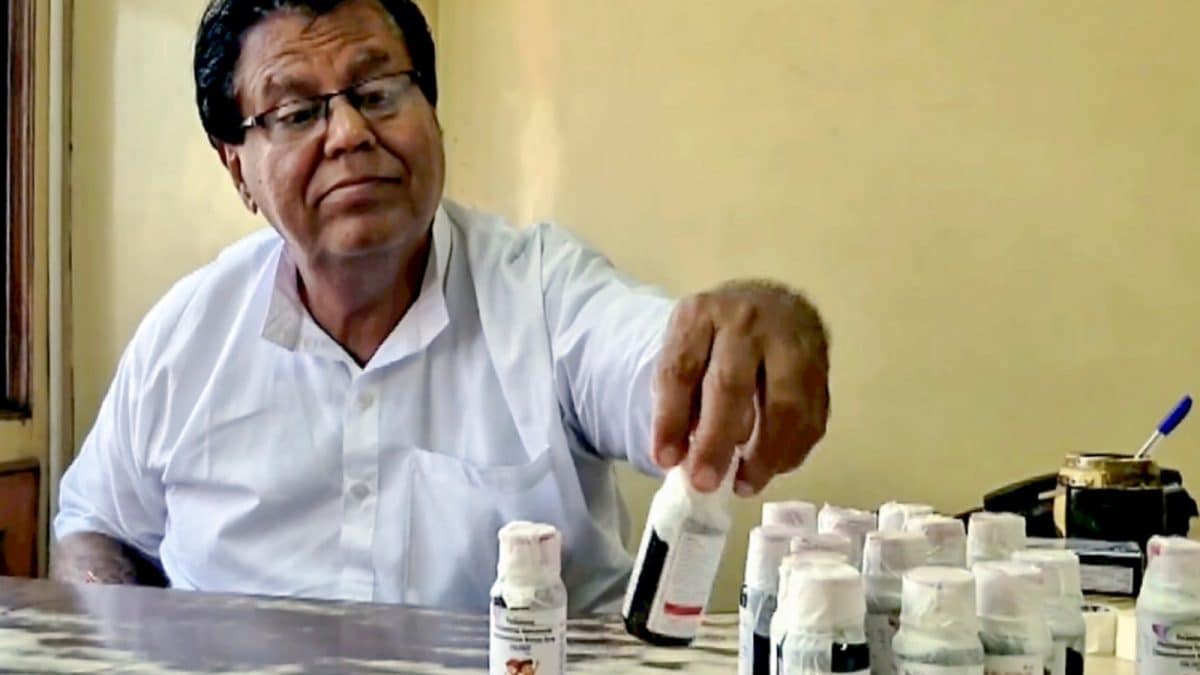Last Updated:
Goa, Karnataka, Maharashtra, and Gurugram (Haryana) have also issued prohibitory orders, directing pharmacies, hospitals, and distributors to withdraw stocks immediately.

The cough syrup, manufactured in Tamil Nadu, was found to be dangerously adulterated with Diethylene Glycol (DEG), a highly poisonous substance. (PTI Photo)
The Puducherry government has become the latest to ban Coldrif Syrup after alarming reports of diethylene glycol (DEG) contamination — a toxic industrial chemical linked to kidney failure and death. The Department of Drugs Control, Puducherry, in an order dated October 6, prohibited the purchase, sale, and distribution of the drug “with immediate effect,” citing a drug alert from Tamil Nadu’s regulator that found the syrup batch adulterated with DEG.
The directive, accessed by News18, warns that the contaminated batch manufactured by Sresan Pharmaceutical, Kancheepuram district, “is known to cause severe poisoning, kidney failure, and even death.” Officials have also directed that sales of similar formulations be tightly monitored, with licenses liable for suspension if prescriptions or records are not maintained.
Recommended Stories
The Puducherry action comes amid a widening clampdown across several states following the deaths of 11 children in Madhya Pradesh’s Chhindwara district, allegedly after consuming the same syrup.
Earlier on Monday, the Punjab Government imposed a complete ban on the sale, distribution, and use of Coldrif Syrup, declaring it “Not of Standard Quality.” A test report from the Drugs Testing Laboratory, Madhya Pradesh, confirmed 46.28 per cent of diethylene glycol, far exceeding the permissible limit of 0.1 per cent.
Along with Punjab’s move, Goa, Karnataka, Maharashtra, and Gurugram (Haryana) have also issued prohibitory orders, directing pharmacies, hospitals, and distributors to withdraw stocks immediately.
Karnataka chemist’s body pushes branded syrups
In Karnataka, the Karnataka Pharma Retailers and Distributors Organisation (KPRDO) has issued a statewide alert warning against the harmful effects of diethylene glycol (DEG) and ethylene glycol (EG) — industrial solvents used in antifreeze, paints, and plastics, which are not meant for medicines. The advisory explains that these substances sometimes contaminate pharmaceutical ingredients like glycerine due to poor oversight or suppliers using cheaper, industrial-grade material. DEG, the circular warns, is highly toxic and prohibited in human products, capable of causing “severe health damage to the central nervous system, heart, and kidneys.”
The KPRDO has urged that the public be made aware of these details and advised that life-saving medicines should only be purchased from top-branded companies, with a valid prescription from an authorised registered medical practitioner and under the supervision of a registered pharmacist. The body has also cautioned consumers against buying drugs from unknown manufacturers offering abnormal discounts, reminding that “life is not for discount.”
Meanwhile, the Union Health Ministry has convened a high-level meeting with all states and union territories to review the quality of cough syrups and enforce stricter oversight on liquid formulations following repeated episodes of contamination.
This is not the first time diethylene glycol (DEG) contamination has triggered panic over cough syrups in India. DEG, a toxic industrial solvent, has been linked to several mass poisoning incidents globally, including in The Gambia and Uzbekistan, where contaminated syrups from Indian manufacturers were implicated in child deaths. Within India, similar tragedies have been reported since the 1970s, with recurring cases in Bihar, Maharashtra, and Jammu. Despite past crackdowns, lapses in quality control and poor oversight of raw material sourcing continue to pose a serious threat to public health and the reputation of India’s pharmaceutical exports.
About the Author

Himani Chandna, Senior Associate Editor at CNN News18, specialises in healthcare and pharmaceuticals. With firsthand insights into India’s COVID-19 battle, she brings a seasoned perspective. She is particular…Read More
Himani Chandna, Senior Associate Editor at CNN News18, specialises in healthcare and pharmaceuticals. With firsthand insights into India’s COVID-19 battle, she brings a seasoned perspective. She is particular… Read More
October 07, 2025, 15:04 IST
Loading comments…
Read More



